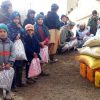
Afghan Economy on Verge of Collapse If Aid Drops, UN Warns
23 April 2023
The United Nations made a renewed appeal for international aid for Afghanistan, warning that a cut in funding in response to the Taliban government banning women from education and jobs would perpetuate extreme poverty that lasts for decades.
Afghanistan remains cut off from the global financial system since the militant group took over in August 2021 following the disorganized withdrawal of American troops. The country needs the dollars from foreign aid to import food and jumpstart the economy.
About $4.6 billion is required in foreign aid this year to prevent Afghanistan from spiraling further, the United Nations Development Programme said in a report published Tuesday, repeating a funding target first announced in February.
The appeal to donor countries comes as the Afghan’s central bank reserves remain frozen by the US and Europe on concerns it will be used to fund terrorism. Washington later agreed to release half of the reserves to bolster the economy but put it on hold after the Taliban banned Afghan women from attending school or working last year.
“The economy and the society are on the verge of collapse,” UNDP’s representative in Afghanistan Abdallah Al Dardari said in an interview before the release of the report. “Any shock or drop in international aid today will push large number of Afghans to an ever worse destiny than what they are facing today.”
If there’s a 30% drop in foreign aid from the $3.7 billion given last year, the economy will contract by 0.4% this year and the inflation rate may surge to 10% in 2024, according to the UNDP’s calculations. Per capita income could fall to $306 next year compared to $512 in 2020, making Afghanistan one of the world’s poorest countries, it said.
Per Capita Income
A 30% decline in aid could further push incomes to fall 40% next year.
But if aid continues at the same level as last year, Afghanistan’s gross domestic product is expected to rise to 1.3% in 2023 and 0.4% the year after, the UNDP said. this is still well below the population growth rate that exceeds 2% and implies that incomes will keep declining, according to the report.
The donor countries spent more than $4 billion on UN-supervised humanitarian projects in Taliban-ruled Afghanistan, whose administration lacks international legitimacy. Last year, the UN received up to 73% of the $4.4 billion requested, but this year so far it has received only 5.4% of the $4.6 billion appeal.
Afghanistan’s growth is estimated to decline 3.6% in 2022 after a 20.7% contraction in 2021, according to the UNDP report. However, there were tentative signs of recovery last year amid an inflow of aid with exports nearly doubling to $1.8 billion, domestic revenues increasing thanks to higher customs collections and inflation moderating slightly, the report said.
Despite sweeping into power more than a year ago, the Taliban administration has been grappling with rising unemployment and living costs while dealing with infighting among its leaders over women’s education and renewed attacks from other terror groups. The UNDP said the number of poor rose to 34 million last year from 19 million in 2020. Afghanistan’s population stands at about 40 million.
The report warned of considerable headwinds from adverse geopolitical factors and economic difficulties of neighboring countries such as Pakistan, which could spill over into Afghanistan as heightened security risks and imported inflation for food and fuel.
“Any reduction in international aid will worsen the economic prospects of Afghanistan and extreme poverty will perpetuate for decades” the report said. “But the economy cannot be reignited if women cannot work, while future economic growth is constrained by underinvestment in girls’ and women’s education.
Source: Bloomberg
there is not post in layout 2

Regional Discussions on Afghanistan Intensify Ahead of Doha Summit
As the Doha meeting nears, special envoys from various nations,...















